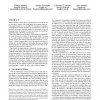Free Online Productivity Tools
i2Speak
i2Symbol
i2OCR
iTex2Img
iWeb2Print
iWeb2Shot
i2Type
iPdf2Split
iPdf2Merge
i2Bopomofo
i2Arabic
i2Style
i2Image
i2PDF
iLatex2Rtf
Sci2ools
142
click to vote
PVLDB
2011
2011
Hyper-local, directions-based ranking of places
Studies find that at least 20% of web queries have local intent; and the fraction of queries with local intent that originate from mobile properties may be twice as high. The emergence of standardized support for location providers in web browsers, as well as of providers of accurate locations, enables so-called hyper-local web querying where the location of a user is accurate at a much finer granularity than with IP-based positioning. This paper addresses the problem of determining the importance of points of interest, or places, in local-search results. In doing so, the paper proposes techniques that exploit logged directions queries. A query that asks for directions from a location a to a location b is taken to suggest that a user is interested in traveling to b and thus is a vote that location b is interesting. Such user-generated directions queries are particularly interesting because they are numerous and contain precise locations. Specifically, the paper proposes a framework...
Computer Networks | Local Intent | Paper | PVLDB 2011 | Ranking |
| Added | 14 May 2011 |
| Updated | 14 May 2011 |
| Type | Journal |
| Year | 2011 |
| Where | PVLDB |
| Authors | Petros Venetis, Hector Gonzalez, Christian S. Jensen, Alon Y. Halevy |
Comments (0)

